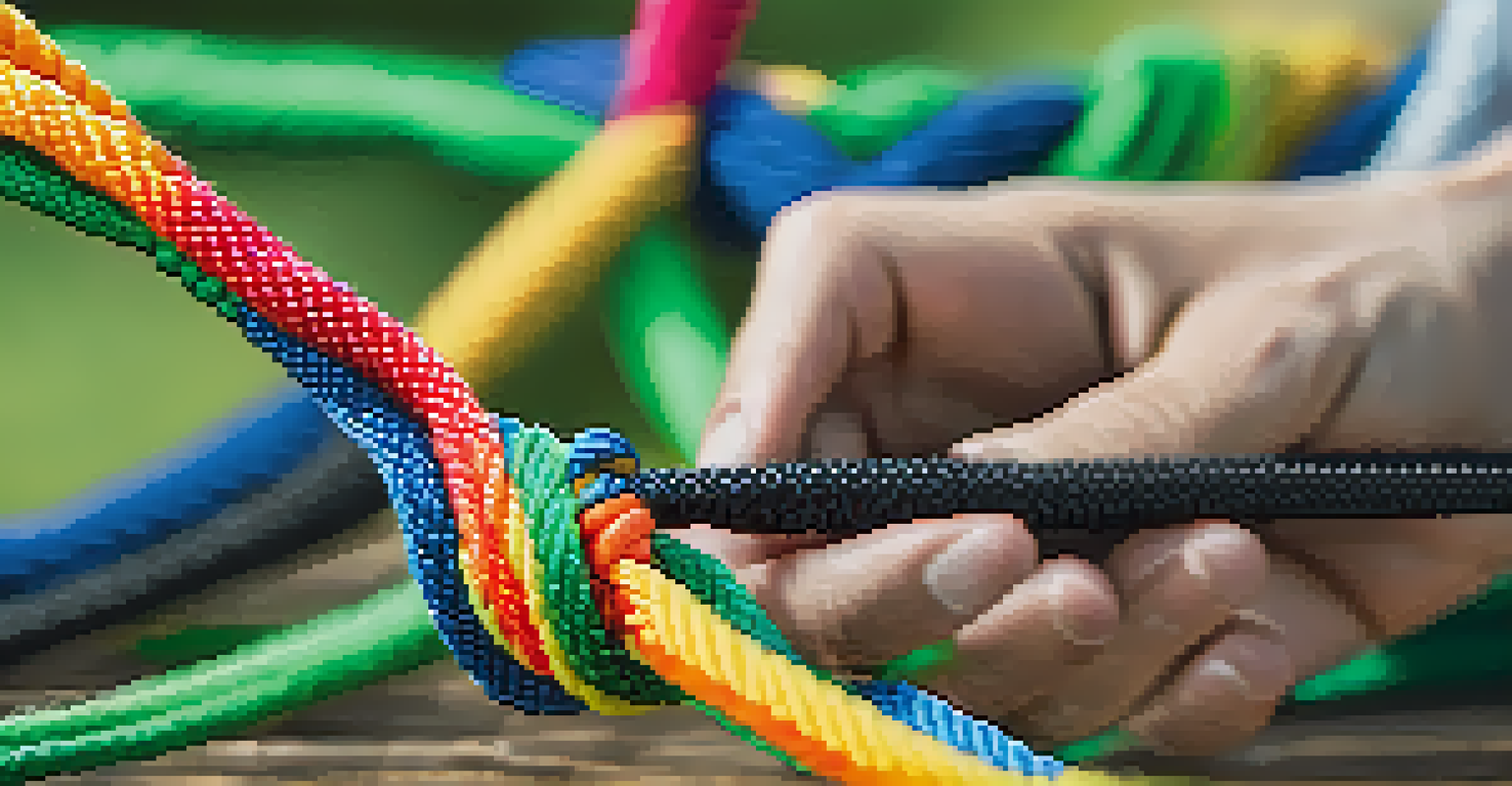Outdoor Skills Workshops: Preparing Students for Life

The Importance of Outdoor Skills in Education
Outdoor skills are more than just fun activities; they are essential life skills. Learning to navigate nature fosters problem-solving, teamwork, and resilience. These skills not only prepare students for outdoor adventures but also equip them for challenges in everyday life.
The greatest danger in times of turbulence is not the turbulence—it is to act with yesterday's logic.
By engaging with the outdoors, students develop a sense of responsibility and self-reliance. They learn to overcome obstacles, whether it's building a shelter or starting a fire. Such experiences promote confidence and independence, traits that are invaluable in any life situation.
Moreover, outdoor education encourages students to connect with nature, fostering a sense of environmental stewardship. As they learn to respect and care for the natural world, they become more aware of their impact on the environment, making them responsible citizens.
Building Confidence Through Hands-On Learning
Hands-on learning is a powerful approach, especially in outdoor skills workshops. When students tackle real-world tasks, like tying knots or navigating with a map, they gain practical experience. This active participation is crucial for reinforcing their understanding and boosting their confidence.

Each successful completion of a task, no matter how small, contributes to a student's self-esteem. Imagine a student who initially struggles to start a campfire; once they succeed, that feeling of accomplishment can spark a desire to tackle even greater challenges. This cycle of learning through doing is transformative.
Outdoor Skills Build Confidence
Hands-on learning in outdoor workshops empowers students to tackle challenges and boosts their self-esteem.
Furthermore, these workshops create a supportive environment where students can learn from their mistakes. Instead of fearing failure, they come to see it as a stepping stone toward mastery, an attitude that will serve them well in all areas of life.
Teamwork and Communication in the Great Outdoors
Outdoor skills workshops are an excellent platform for promoting teamwork and communication. Activities often require students to collaborate, whether it's setting up a tent or planning a hiking route. These shared experiences teach them how to work effectively with others.
In every walk with nature, one receives far more than he seeks.
As students engage in group tasks, they learn to listen to diverse perspectives and share their own ideas. This exchange fosters a sense of community and belonging, essential for their social development. Working as a team also teaches them the value of compromise and negotiation.
Through these interactions, students build strong communication skills that extend beyond the outdoors. The ability to articulate thoughts clearly and work collaboratively is a valuable asset in any future workplace or social setting.
Problem-Solving Skills Through Outdoor Challenges
Outdoor workshops present unique challenges that require quick thinking and adaptability. Whether navigating a trail or addressing unexpected weather changes, students learn to assess situations and make decisions on the fly. This hands-on problem-solving approach is vital for their personal and professional growth.
These experiences encourage students to think critically and creatively. For instance, if a group gets lost during a hike, they must strategize and collaborate to find their way back. Such scenarios teach them to analyze problems from various angles and consider multiple solutions.
Teamwork Enhances Communication
Collaborative outdoor activities teach students effective teamwork and essential communication skills.
By regularly engaging in problem-solving activities, students become more resilient. They learn that setbacks are often part of the journey and that persistence is key to overcoming obstacles, a lesson that applies in all aspects of life.
Fostering a Connection with Nature
In our increasingly digital world, fostering a connection with nature is more important than ever. Outdoor skills workshops immerse students in the natural environment, allowing them to appreciate its beauty and complexity. This connection nurtures a sense of wonder and curiosity about the world around them.
Experiencing nature firsthand can have profound effects on mental well-being. Studies show that spending time outdoors reduces stress and anxiety, contributing to overall emotional health. By engaging with nature, students learn to find tranquility and balance in their lives.
Furthermore, this connection inspires students to advocate for environmental conservation. As they develop a deeper understanding of ecosystems, they are more likely to become proactive stewards of the earth, ensuring its protection for future generations.
Leadership Development in Outdoor Settings
Outdoor skills workshops are a breeding ground for leadership development. In group activities, students often take turns leading tasks, allowing them to practice leadership in a supportive environment. This experience helps them understand the responsibilities and challenges that come with guiding others.
Through these leadership opportunities, students also learn the importance of empathy and support. They discover that effective leaders empower their peers and foster a sense of trust within the group. This realization is crucial for their development as compassionate leaders in the future.
Connection with Nature Matters
Engaging with the outdoors fosters environmental stewardship and promotes overall mental well-being.
Moreover, the outdoor setting encourages students to step outside their comfort zones. As they face new challenges together, they learn to inspire and motivate one another, cultivating essential leadership qualities that will benefit them in all aspects of life.
Life Skills Beyond the Classroom
The skills learned in outdoor workshops extend far beyond the classroom. From cooking over a campfire to navigating with a compass, these practical abilities are invaluable in everyday life. Students gain a sense of self-sufficiency that empowers them as they transition into adulthood.
These workshops also teach essential life skills such as time management and planning. Preparing for an outdoor trip requires students to organize their gear and schedule, fostering a sense of preparedness that translates to other areas of their lives. This proactive mindset is key to achieving future goals.

Ultimately, outdoor skills workshops cultivate well-rounded individuals equipped with a diverse skill set. The experiences gained in these settings prepare students not just for outdoor adventures, but for the myriad challenges they will face as they grow and evolve.
Conclusion: The Lasting Impact of Outdoor Skills Workshops
In conclusion, outdoor skills workshops provide students with more than just fun experiences; they prepare them for life's challenges. The skills learned—whether in teamwork, problem-solving, or leadership—are invaluable assets that shape their character and future.
As students connect with nature and engage in hands-on learning, they cultivate a sense of confidence and responsibility. These workshops empower them to take on life’s obstacles with resilience and creativity, essential traits in an ever-changing world.
Ultimately, investing in outdoor skills education is investing in the future of our youth. By equipping them with the tools they need to thrive, we are helping them become capable, compassionate individuals ready to make a positive impact in their communities.